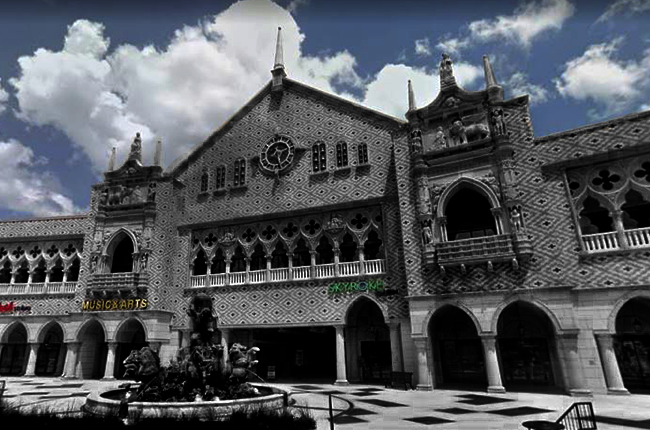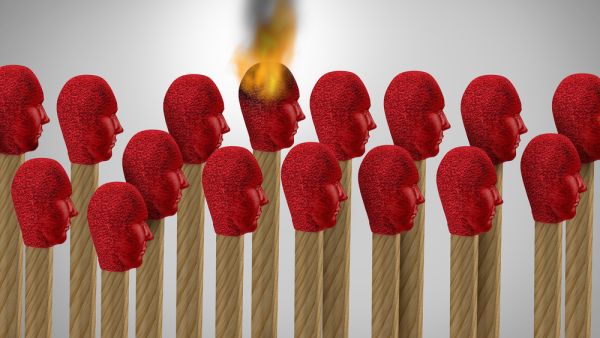By Ty Joplin
Out of all the things I expected to see on my holiday trip back to the U.S., a series of lavish, Roman-style churches built in the middle of nowhere was not one of them; but there they were.
Lining the side of a highway far outside Houston were buildings adorned with steeples, buttresses, statues of saints, embellished engravings and signs for stores. It was a strip mall. Arts and craft shops, boutique clothing stores and salons, massive and empty parking lots; these Vatican-esque storefronts had it all.
In true strip mall fashion, they were placed beside each other, with montoned grey and brown building fronts separating them. Banal observations like ‘this is was the best illustration of America’s worship of consumerism’ aside, I was horrified and intrigued.
I’m not sure I noticed how deep the U.S.’ deference and strict respect for consumerism went before I left years ago, but coming back, I was confronted by this reality every day.
After hearing friends I hadn’t seen in nearly a decade incessantly discuss their respective credit lines, frequent flyer mile plans and rigid plans for the next year while subtly signalling they were tired, burned out and exhausted from working all the time made, I felt like a stranger in my own country and a loner in my social circle.
I flew in hoping to reconnect with the things I sacrificed for a career in journalism and research in the Middle East, namely friends, family and the American sense of possibility, only to leave bewildered by how my young friends could seem so jaded and that sense of possibility utterly channeled through an impersonal consumer market.
I was shocked to see that the market has become a foundational basis from which they understand society and developed values, even if it exacerbates the suffering and myriad crises which have befallen the U.S.
Re-encountering America-Styled Consumerism
The Rome-styled strip mall outside Houston (Google Earth)
Among the many things that America has which my new country, Jordan, does not, is copious amounts of billboards. Massive billboards line American highways for their thousand-mile stretches. They basically never end, and they seem to only advertise for the same set of five-to-ten restaurants that hug major motorways.
It were these, and the jarring commercials for antidepressants, that I first noticed after landing in Houston. Next, I noticed that the conversations my friends had have changed drastically since I last saw them about eight years ago.
Friends exchanged tips on getting frequent flyer miles, discussed in-detail the exact benefits they each receive from their credit card plans and had a stream of stories related to the complimentary hotels they live in when they travel for their various consultancy gigs. These things would just come up sooner or later, and eventually they would dominate the conversation entirely.
I sat and took it all in silently.
The Rome-styled strip mall outside Houston (Google Earth)
For the vast majority of my social network in Jordan, these things might as well not exist, and beyond hearing about frequent flyer miles, I did not know so many aspects of life and travel were now subsumed into structured credit plans, many of which were associated with work.
Occasionally, some friends offered to pay for my meals for no other reason than going over a monthly or quarterly credit goal to receive something called ‘points,’ presumably to be able to buy more things.
When they did pay for me, they wielded shiny new credit cards that were cold to the touch, heavy and made of some kind of metal. Some even had revered words engraved on them, pulled from the top shelf of cultural capital; words like ‘reserve’ and ‘platinum.’ The cards looked like they were cultivated and put in a wine barrel for years before they were mailed out to only the most exclusive and ‘premium’ customers. They then went on to be used to pay for tacos I found inside ageing truck stops somewhere along a road.
My credit card, dirty, old and an ugly shade of anxious yellow, barely worked when I tried to swipe or insert it anywhere.
Though this all seemed natural to them, so too did the exhaustion that came with having a life revolve entirely around work, work-related travel and credit-based consuming. Many of my friends repeated the refrain that they wanted out of their respective industries and lifestyles, but had no tangible plans to ensure their escape.
The Underlying Burnout
The Rome-styled strip mall outside Houston (Google Earth, edited by Rami Khoury/Al Bawaba)
After hearing these conversations for weeks and feeling estranged by them, I noticed that they embodied a particular phenomenon that has gone under the radar for years but is now being articulated more clearly: Millennial burnout.
People born between the years of 1981 and 1996 lead a substantively different life than their predecessors from the Boomer and Gen X generations: our lives are more precarious and consumed by work.
We are objects to market whims and we have adapted accordingly to become our own ambassadors for the Brand of You. Never feeling safe or ensured of safety nets, stable wages or secured future plans, many of us maintain social media presences on multiple platforms to illustrate how sociable, successful and marketable we are.
We pay hundreds of thousands to get into the most reputable private universities, going into debilitating debt in the process, only to feel pressure to go even deeper into debt to get yet another degree from a similarly expensive program. If we follow this rule book well enough and land in a big industrious city, our cost of living burns through our paychecks and our debt slowly mounts. Some of us work ‘gig’ jobs to mitigate our financial strain, while others double-down at their job to do whatever they can not to be laid off.
A breakthrough meditation on the matter from Buzzfeed’s Anne Helen describes the predicament of Millenials well:
“We have far less saved, far less equity, far less stability, and far, far more student debt. The “greatest generation” had the Depression and the GI Bill; boomers had the golden age of capitalism; Gen-X had deregulation and trickle-down economics. And millennials? We’ve got venture capital, but we’ve also got the 2008 financial crisis, the decline of the middle class and the rise of the 1%, and the steady decay of unions and stable, full-time employment.”
In the face of this economic precarity and skyrocketing income inequality, many Millenials take a market-driven approach to maximize their employability by maintaining their Twitter and LinkedIn, by going to drinks with people who could only be described as potential contacts and by not knowing when the professional ends and the personal begins.
“‘Branding’ is a fitting word for this work, as it underlines what the millennial self becomes: a product,” writes Helen. “And as in childhood, the work of optimizing that brand blurs whatever boundaries remained between work and play. There is no “off the clock” when at all hours you could be documenting your on-brand experiences or tweeting your on-brand observations.”
By extension, our political imagination is grounded firmly in the market’s edicts, which limits our ability to see past its reach.
This reality hit me in the face at an Applebee’s at midnight, somewhere in the outskirts of a tiny Arkansas town. It was the only location in the town that sold alcohol on Sundays. We were cramped into a corner booth after a wedding of a mutual friend.
The wedding itself started promptly at 5:30 PM and ended promptly at 10. The bride and groom disappeared somewhere, leaving us to search our phones for the next best thing to do in the town. So we landed at the Applebee’s.
There, we got into a heated political argument about education and whether it should be free. I found it strange that many would freely give so much of their money to Walmart without thought of what the corporation would do with it all, but seek to add myriad conditions on where their tax money would go for education.
Some found the idea of a free college degree laughable, remembering how they had to pay their way through theirs. Others thought the government should only fund marketable majors like business or engineering.
That education was a right, mandating governments to ensure its access simply wasn’t relevant: the only thing that mattered was how people and the government should work more toward ensuring their best outcomes in a market.
Strangely enough, this viewpoint is increasingly common, evinced by the fact that young Americans, when polled, trust Google and Amazon more than most major governmental institutions to be effective moral actors.
Many conversations about rights have been replaced by brainstorming sessions on how to better commodify oneself, and on how governments should do the same.
It was revealed that me and my friends now have different ideas of what societies and governments exist for. Genuinely discussing this in an Applebee’s felt impossible while we were tired and buzzed, so the conversation faded and went back to trading tips about accumulating points on their credit cards. Eventually we drifted to our shared Airbnb and fell asleep.
It’s more than the feeling that work never seems to end because a market always incentivizes its continuation: it’s that the market is an end in and of itself. It is now, somehow, a moral and social starting point around which we organize and mobilize.
This type of thinking I had not encountered since the last time I left the U.S.
Is It Working?
(Shutterstock, edited by Rami Khoury/Al Bawaba)
The burgeoning culture of being an ambassador for the Brand of You, and of maximizing your employability to no end, hasn’t actually worked to help that many people.
It rather appears to be a symptom of a consumer economy grinding its way into a dark chasm filled with inequality and chronic precarity.
Overall consumer spending has steadily increased the past 30 years even though wages have stagnated and debt has steadily increased. The average U.S. household has about $7,000 in credit card debt. Much of this can be attributed to rising prices of essential goods and a relatively isolated class of top-tier income Americans incessantly spending while getting richer. Meanwhile, upward socioeconomic mobility is screeching to a halt, meaning less Americans are able to work their way to a comfortable or even prosperous economic position.
We may be becoming more nimble at finessing increasingly complicated credit reward plans, but no amount of finessing can make up for the fact that our overall purchasing power is slowly dwindling.
Table showing wage stagnation compared to steady gains in productivity since 2000 (New York Times)
A recent Pew study found that 46% of Americans spend more than they earn every month, and only 47% reported to have stable incomes at all. Further, a Department of Commerce study found a slow-burning, silent recession in a third of all U.S. counties, while most others saw only modest gains since the 2008 Great Recession. Again, only tiny sliver of America at the top saw double-digit economic gains, pointing to a widespread trend that some Americans are truly prospering, while hundreds of millions more can barely make ends meet.
While we make less, spend more, go deeper into debt, work more and continue to feel the market to be precarious, we are increasingly trusting it to provide us a modicum of welfare and safety.
With these realities forming the bleak backdrop to my friends’ odd fetishization of commodities, credit lines and reward points, I felt dislocated from the America I’ve read about while abroad.
I knew all too well that the U.S. was becoming more economically segregated. But I didn’t know that meant some of my friends would obsess over the perks of being in the privileged class, gloating and gossiping about the things only people with good credit, a busy scheduling of flying, consulting and staying at complimentary hotels could have access to in order make their lives that much more easy and cheap.
I didn’t expect to see so many Americans to decry the gaping abyss of inequality but defend the reasons why it exists.
Nor did I expect to see them enjoy the spoils of having made it to the other side without ever looking back at those left behind, or looking down to see how shaky the ground they are standing on actually is.







